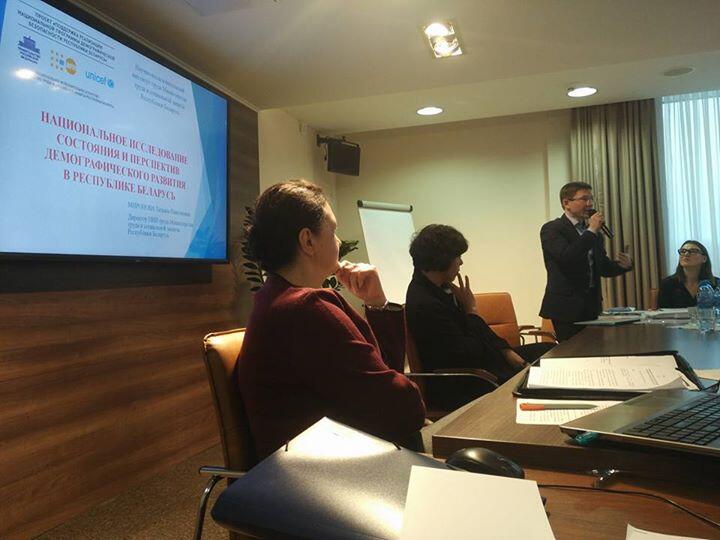A round table discussion as part of the project "Support to the implementation of the national programme of demographic security of the Republic of Belarus" funded by the Government of the Russian Federation, UNFPA and UNICEF was held in Minsk on November 18, 2016. The participants of the round table discussed the prospects for the development of the capacity of research and educational institutions of the country in the field of demography.
The demographic policy is implemented in the Republic of Belarus through state programmes. The third programme in the field of demographic development "Health of the Nation and Demographic Security of the Republic of Belarus" (hereinafter Programme) will be implemented between 2016 and 2020. As part of the round table, the approaches used at present for the performance evaluation of the Programme and alternative methods of monitoring and evaluation of the currently designed demographic policy were discussed.
During the round table, a study guide "PRACTICAL DEMOGRAPHY" for the executives and professionals of government bodies was presented. The guide was created by the staff of the Republican Institute of Advanced Training of the Ministry of Labour and Social Protection of the Republic of Belarus, Research Institute of Labour of the Ministry of Labour and Social Protection of the Republic of Belarus, Ministry of Health of the Republic of Belarus, Centre for Social Demography, and the Institute of Socio-Political Research of the Russian Academy of Sciences.
At present, the demographic situation in the Republic of Belarus is unstable, and researchers have the task to provide information about the demographic changes, threats and challenges in the country to the government and civil society, and to seek solutions. Without understanding the demographic situation, demographic development trends, various aspects of the reproduction process (reproductive and migratory behaviour of the population, gender problems, family policy, etc.), and without demographic estimates and projections, it is impossible to ensure an evidence-based development of various aspects of the society and the state. Therefore, the task of enhancing the potential of Belarusian scientific and educational institutions in the field of demography is becoming vitally important.
Capacity building in the area of demography involves the evaluation of the current potential, strategic planning, and monitoring of the process and results of capacity building and capacity development. As of today scholars and practitioners around the world have a considerable experience of dealing with these tasks. For the Belarusian demographic science and demographic education it is extremely important to study this experience and use it for the capacity building of research and educational institutions in the area of demography.
Researchers, teaching staff of higher educational institutions, staff of government bodies and organizations involved in the analysis of demographic problems and processes of the development, implementation and evaluation of the national demographic policy participated in the discussion.
M. Sokolova, Manager of the project "Support to the implementation of the national programme of demographic security of the Republic of Belarus" (UNFPA), acted as the moderator.


